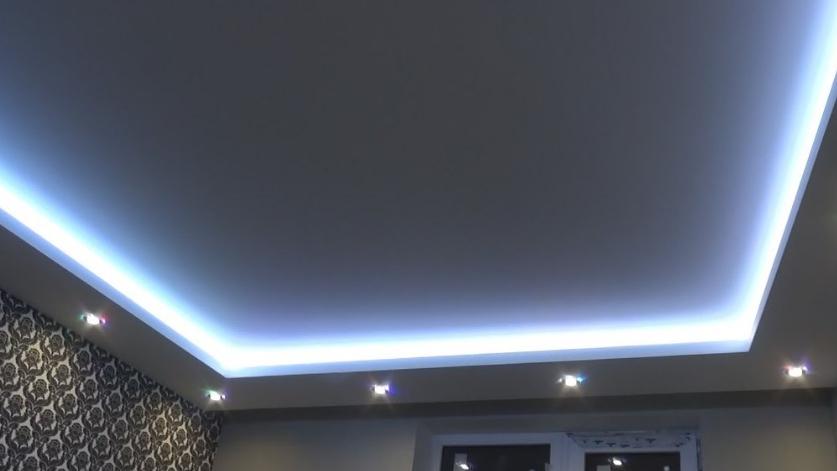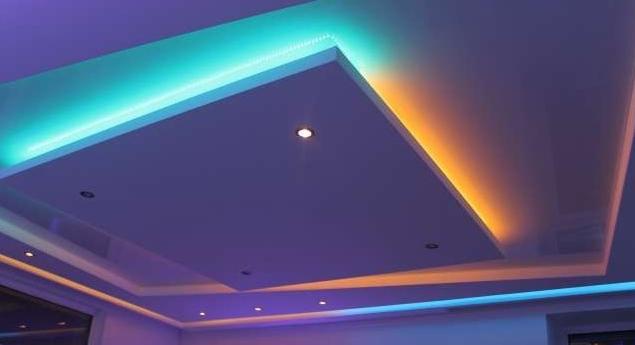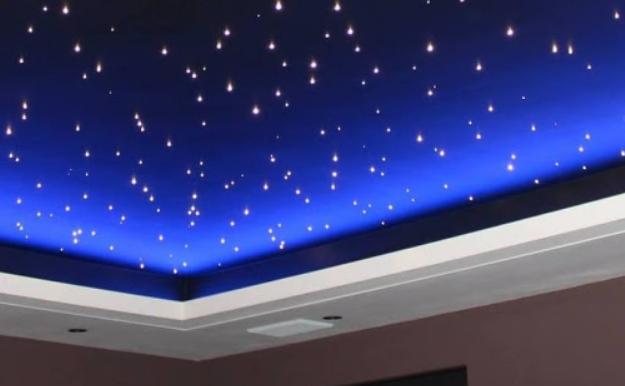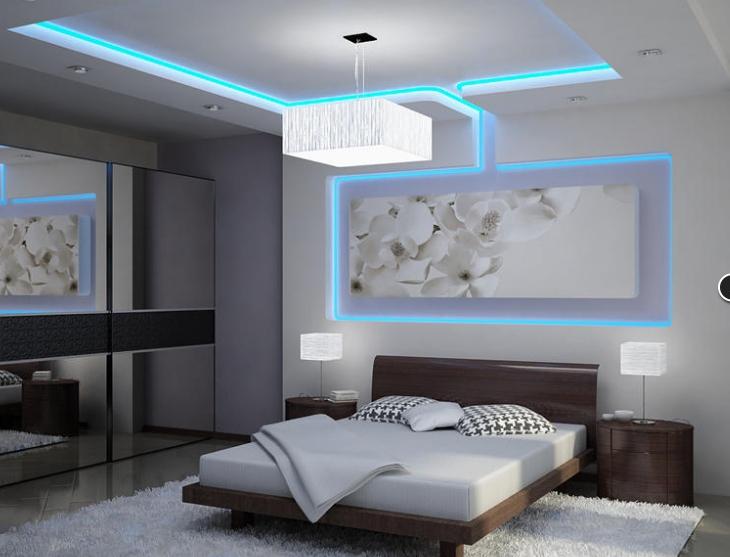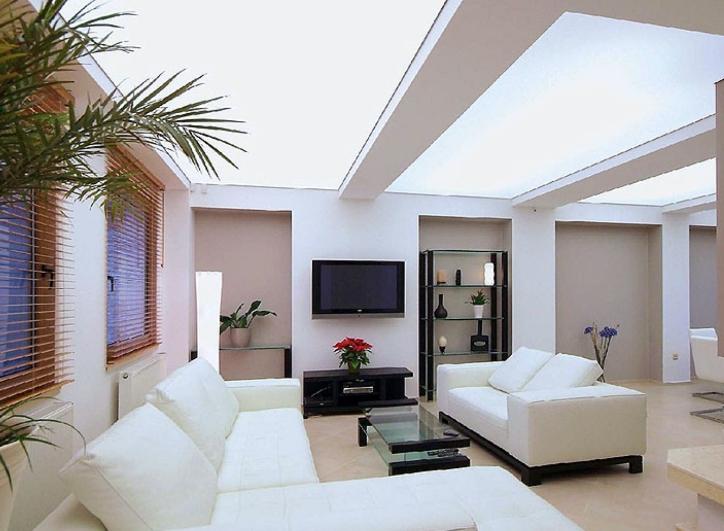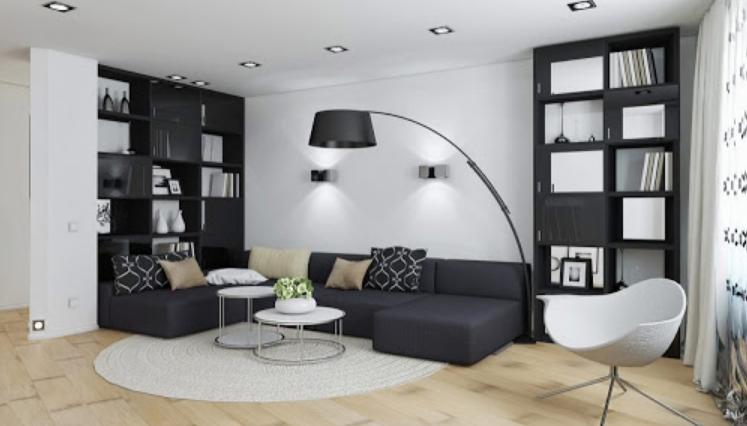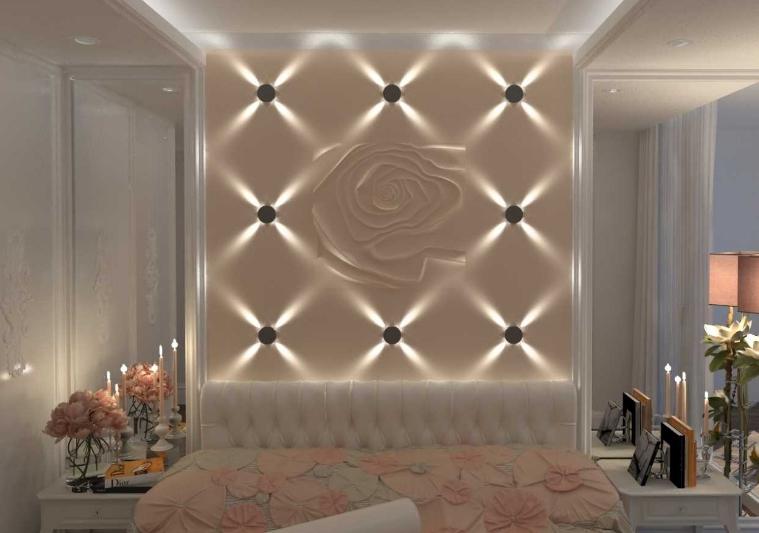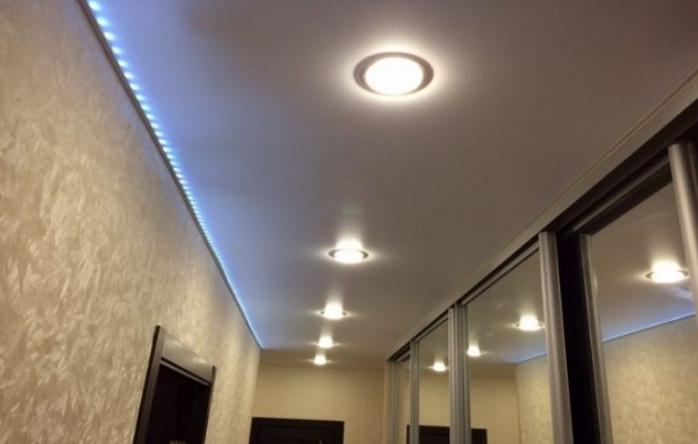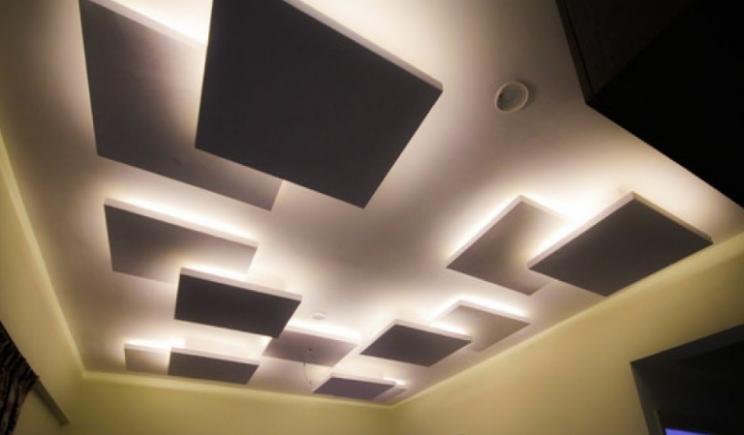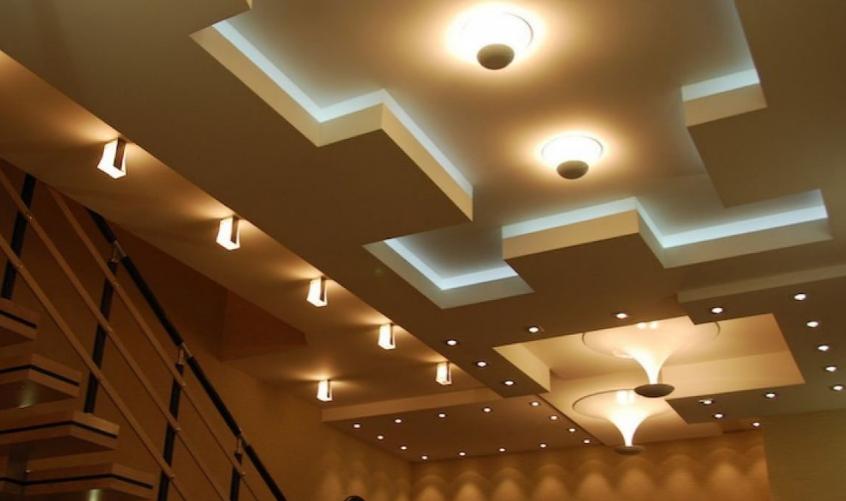How to make a ceiling with lighting with their own hands
Ceiling lighting not only transforms the room, but also helps to hide its shortcomings. In addition, this solution makes the interior more expressive, it can be turned on constantly or from time to time. And if you want, it is easy to make illumination, which will replace the main light and fill the room with soft diffused light.
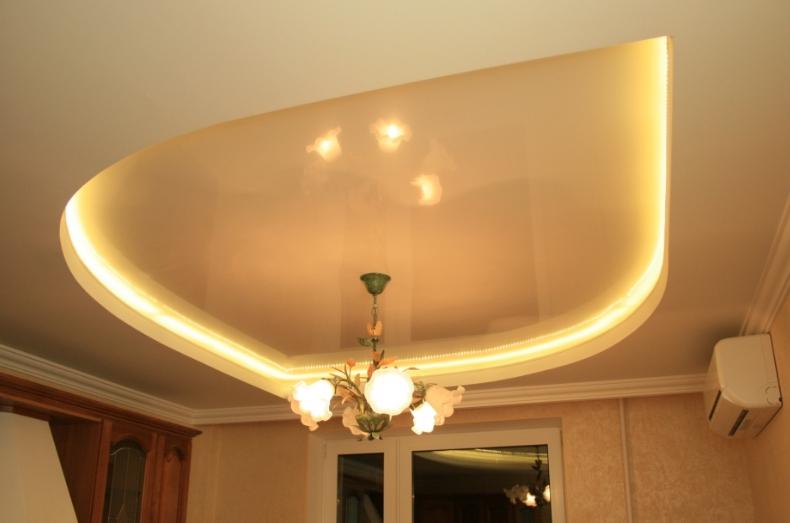
Types of lighting
There are many options, but there are several basic solutions, so it is not difficult to understand them. When choosing, you should be guided by the peculiarities of the interior, the size of the room and the stylistics of its design. It is also important to consider the design of the ceiling, sometimes it allows you to implement only one or two options. The most popular types:
- Contoured scattered.. In this case, the light is directed at the surface of the ceiling or wall and highlights the perimeter of the ceiling due to reflection. Attractive option, which can be both monochrome and multicolored, such a solution is distinguished by the simplicity of implementation, you do not have to understand the schemes and drawings.
- Contoured directional. In this case, the light comes from under the baseboard and directly hits the ceiling, its intensity is much higher. If you use this option on stretch panels, due to the reflection, the illumination will be much brighter. And if you leave a gap of 10-15 cm between the ceiling and the baseboard, and install a few rows of LED strip, you can provide basic lighting.The tape can be hidden in the ledge around the perimeter.
- The effect of a "floating" ceiling. Suitable for plasterboard structures with projecting elements. A niche is made around the perimeter, in which the LED strip is placed so that it shines from the bottom up. Due to this, it seems that part of the structure hangs in the air.
- Built-in. There can be two options - "starry sky", when they put special pins in the suspended ceiling, transmitting light from inside. Or even lighting due to the translucent matte canvas.The illusion of a starry sky can be created with special pins.
- Contouring. Special profiles with a diffuser are used, which can be installed in the ceiling, creating any geometric shapes. The larger the size of the box, the brighter the light will be.The contour can go from the ceiling to the walls, creating an interesting effect.
- Spot. In this case, recessed or overhead lights are used, which illuminate a certain area or highlight interior elements. They are often placed in kitchens, hallways and living rooms.
Ceiling illumination is implemented by using different light sources:
- LED strip. The most convenient solution, which is not difficult to install yourself. Single-color and multicolor options are sold, the power depends on the number of diodes per linear meter.
- Tape duralight. Used less frequently, as it costs more and has a number of nuances on installation.
- LED bulbs and lamps. Not a bad solution with low power consumption and high quality light. Used most often for spot lighting.
- Halogen lamps give good light, but are very hot during operation.
- Incandescent bulbs are hardly used nowadays because of heating and high power consumption.
Choice of lights depending on the ceiling
Not all options are suitable for certain conditions. Therefore, before making ceiling with lighting, it is necessary to take into account the peculiarities of the design and choose what is most suitable:
- Concrete and wooden surfaces are different in that they can not locate built-in lights. For backlighting, overhead equipment is used. Also great is the option of lighting from under the baseboard, fixed along the perimeter just below the level of the ceiling. In this case, the wood and concrete are strong, which simplifies installation if you need to install an element with a lot of weight.
- Tensioned ceilings are used very often, this option can be called the most convenient for installing lighting. Almost anything that is available on the market can be placed here. The cavity under the canvas allows you to mount recessed lights, and also on such ceilings looks great scattered and directional contour illumination. It is possible to make a starry sky or to stretch a translucent material, which will give a bright light due to the lamps fixed above it.The light penetrates well through the translucent tensioned fabric.
- Multilevel and standard plasterboard designs also allow you to implement any variant of illumination. In this case, you can initially provide a niche or ledge, where the LED strip is subsequently placed. It is possible to make irregular curves, ovals and protrusions and give them a floating effect. It is also possible to install light profiles or boxes in the ceiling to create clear lines of any color.
The aluminum profile with diffuser is designed for stretch ceilings, but is also suitable for plasterboard structures, as it does not weigh much and can simply be glued.
Variants in different rooms
Layout and type of lighting should be selected individually for each room. First of all, you need to take into account the features of the main light, so that the lighting complements it.
Living room or living room
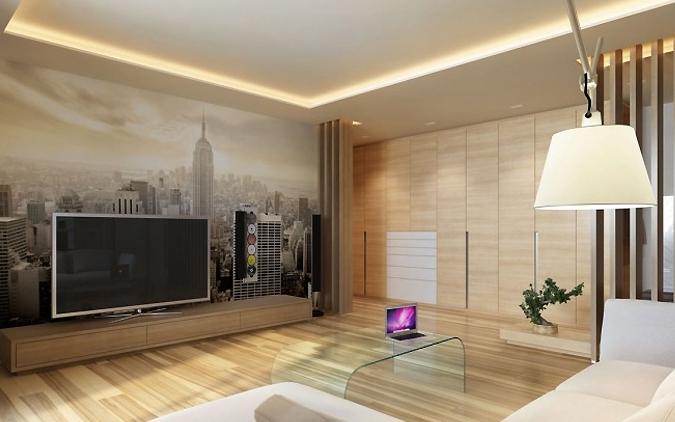
In this case the lighting can accentuate certain elements of the interior or create a relaxing atmosphere. Soft LED perimeter lighting or directional light, highlighting pictures, decorations, or simply forming a light composition on the wall.
Lighting can also serve as additional lighting for the seating area, or for the place where there is an upholstered chair. In this room, it is best to put adjustable systems to adjust the brightness.
The video shows the installation of the most economical version of room lighting.
Bedroom
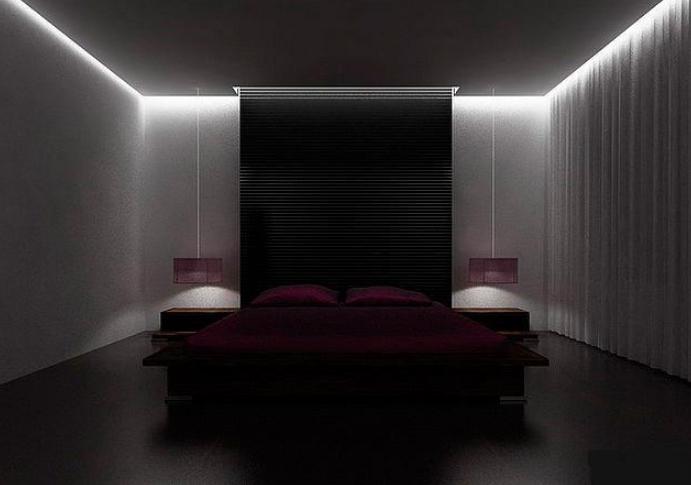
This room requires light, which disposes to rest and relaxation. Therefore, select lighting with a warm yellowish light, it is better not to use colored options. The easiest way to lay in the niche along the perimeter of the monochrome strip with the possibility adjusting light intensity. Then it will be possible to use only backlighting, not including a chandelier.
Also in the bedroom is often used such solutions as lighting the headboard or niches that are built into the wall, it looks spectacular. A separate option - LED strip at the bottom of the bed to create a floating effect, this solution looks unusual.
Video selection of modern bedroom lighting ideas.
Children's room .
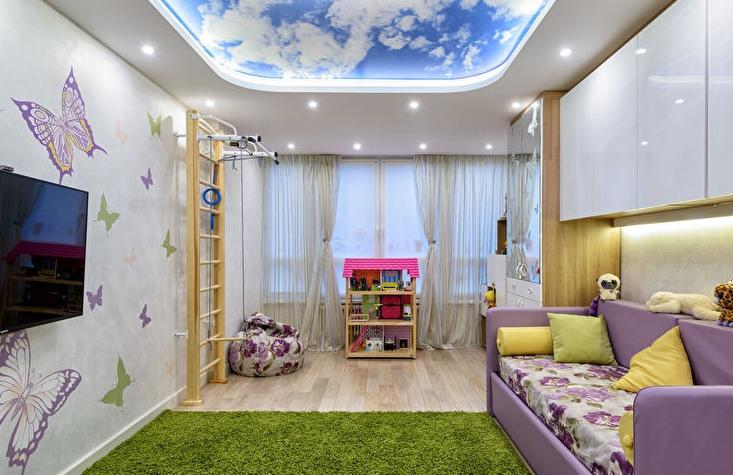
In a child's room, you should not make the lighting too bright, it should be unobtrusive so as not to strain the child's eyesight. You can emphasize the originality of the multilevel ceiling design or highlight interesting elements of the environment, such as a map or picture on the wall.
It is better to use a dimmer to adjust the brightness and color (for multicolor strips). Then the dimmed light can be used as night lighting. In this case, it is adjusted to a minimum brightness, so that the room was slightly lit, children like this option very much.
Ceiling of plasterboard with backlighting and volumetric figures.
Bathroom
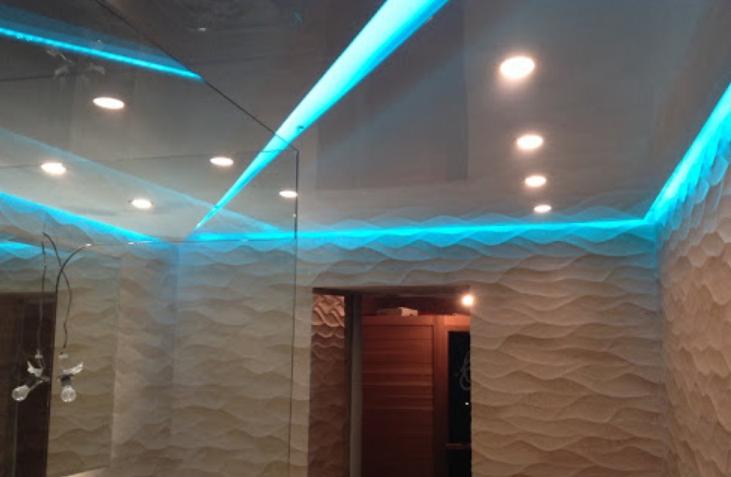
Due to the reflective surfaces, the lighting improves the overall illumination of the bathroom. It is best placed on the ceiling. You can put a LED strip around the perimeter, or you can place several spotlights in suitable places.
A separate option - lighting the mirror, it's not only beautiful, but also convenient. Most often used LED strip attached to the perimeter of the frame or hang fixtures. It can be two wall-mounted options on the sides or one long LED lamp on top.
For the bathroom, it is better to choose equipment with increased protection against moisture.
Topical video: Lighting in the bathroom with a contour profile.
Corridor or hallway
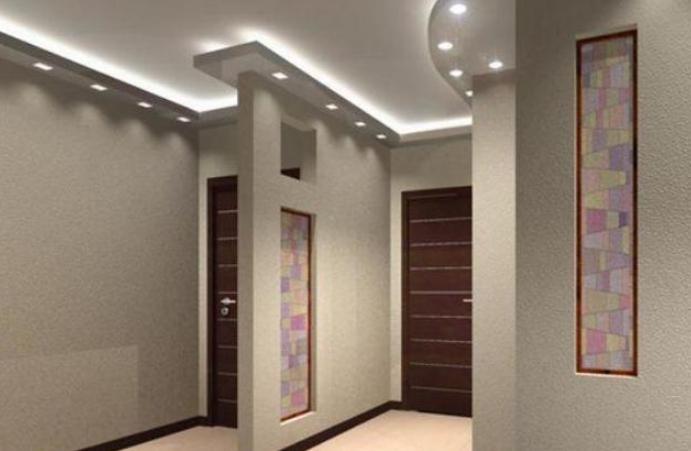
If the room does not have natural light, the lighting will help to create a more comfortable environment. You can put it around the ceiling or use spotlights Separate areas in the hallway.
Using the LED strip can visually expand the space, for this it is better to use diffused or reflected light. In this case, it is better to finish the ceiling with light materials or install a glossy stretch ceiling in the corridor, well reflecting light.
Recommended for viewing: Multilevel ceiling with light lines crossing the wall.
Kitchen
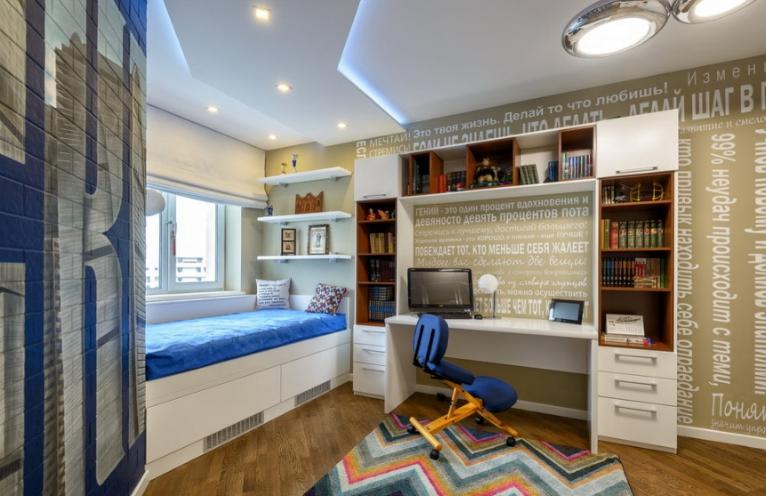
Here, decorative lighting is needed to create a calm atmosphere and decorate the room. A good option would be lighting from niches or the installation of directional lights along the walls.
Another good solution is zoning the space with backlighting, in this case it must shine brightly enough. You can direct the light both on the ceiling surface and along the walls.
There are no particular restrictions on the stylistics of the interior. Backlighting is suitable for any environment. The main thing is to choose lamps in the appropriate style that will fit seamlessly into the room.
Photos of ready-made options
Here are some interesting ideas that you can implement in your apartment.
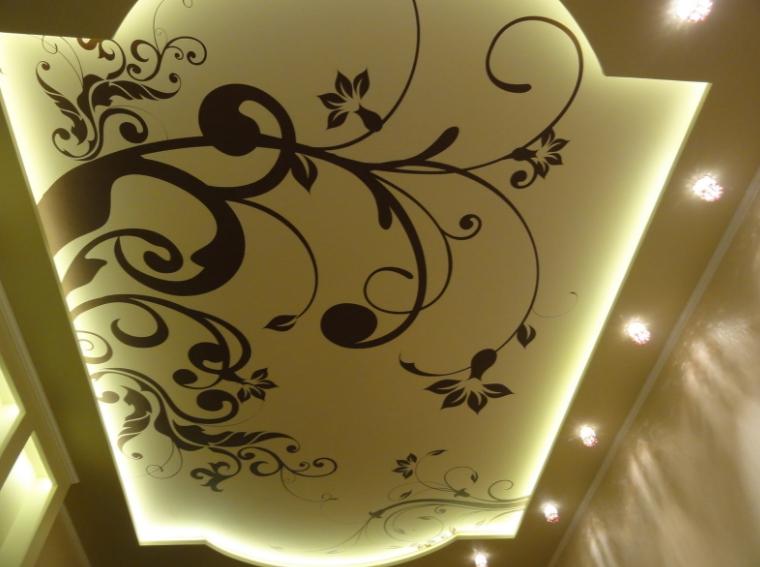
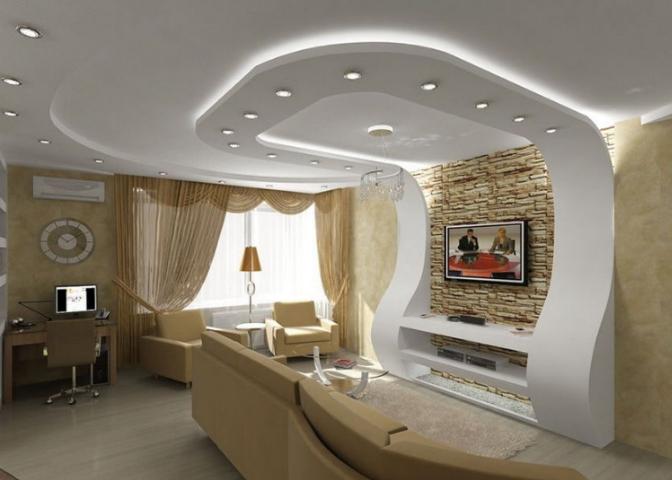
Making a ceiling with lighting is not difficult, as there are many interesting options. You can find a suitable solution for any room and different types of ceilings.
